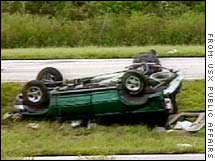RESEARCH A CAR
Get invoice and market prices, specs, reviews and photos
GET A QUOTE
RESEARCH A USED CAR
Get used car pricing, reviews, ratings, and more.
|
|
|
|
 |
| Auto safety advocates are criticizing new Federal rules requiring stronger auto roofs because of a limit on lawsuits against automakers who meet the new standard. |
|
|
|
NEW YORK (CNN/Money) -
Auto safety advocates are criticizing new rules requiring stronger vehicle roofs because of a provision that would limit lawsuits against auto manufacturers.
The proposed federal rules, which are designed to protect drivers and passengers in case of a vehicle rollover, include a provision that says if vehicles meet minimum federal safety standards, consumers do not have standing to file product liability lawsuits, according to a report in the Detroit News.
The protection from lawsuits could save auto manufacturers tens of millions in legal costs, according to the newspaper. Safety experts who had been pushing for stronger roof requirements told the newspaper the provision is back-door tort reform that will leave consumers vulnerable and usurp the right of a jury to decide whether a company should be held liable.
"I can't tell you how bad this is for consumers," Clarence Ditlow, executive director of the Center for Auto Safety, told the newspaper. He had earlier told the Los Angeles Times the provision is "a product liability bailout for manufacturers who have weak roofs today and will continue to be allowed to have weak roofs in the future."
The rules on stronger roofs are being proposed by the National Highway Traffic Safety Administration. States shouldn't be allowed to enforce their own standards through jury verdicts, according to NHTSA spokesman Rae Tyson in comments to the News.
"Congress has given us the authority to set safety standards," Tyson told the newspaper. "We're merely restating our authority. We're the agency that sets standards. Our standards are not minimum standards."
The newspaper reports that in a 2004 San Diego trial, a jury ordered Ford Motor Co. (Research) to pay $369 million in compensatory and punitive damages to a woman paralyzed when her Ford Explorer's roof collapsed, even though Ford argued that the Explorer met existing federal safety standards.
Consumer groups say they expect NHTSA to attach liability limit language in all future regulations. One advocate says that limit would hurt safety even when minimum standards are made more stringent.
"They've gone from having just the minimum to setting the minimum and the maximum," Sean Kane, president of Safety Research and Strategies, a Massachusetts legal research firm, told the newspaper. "Under this regulation, there's absolutely no incentive for any manufacturer to go beyond the standard."
A spokesman for General Motors Corp. (Research) told the newspaper that auto manufacturers did not push for the limit on lawsuits in the new rules.
"We were somewhat surprised that this was included," GM spokesman Chris Preuss told the newspaper. "It was not something we asked for. That said, we think the proposal makes a lot of sense. It's not the role of juries to determine thresholds for something being safe or unsafe."
For more news on autos and auto manufacturers, click here.

|